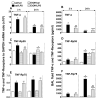Acute alcohol intake impairs lung inflammation by changing pro- and anti-inflammatory mediator balance
- PMID: 17889310
- PMCID: PMC2075099
- DOI: 10.1016/j.alcohol.2007.07.002
Acute alcohol intake impairs lung inflammation by changing pro- and anti-inflammatory mediator balance
Abstract
Previous studies have shown that alcohol (ethanol [EtOH]) intoxication impairs lung immunity by affecting cytokines pivotal to the inflammatory process. The objective of this study was to test the hypothesis that acute alcohol intoxication impairs lung innate immunity by downregulating the expression of proinflammatory mediators while simultaneously upregulating anti-inflammatory mediators. EtOH was administered to the mice 0.5h prior to an intratracheal injection of Escherichia coli lipopolysaccharide (LPS). The animals were killed either 4 or 24h after LPS to recover plasma, lungs, and bronchoalveolar lavage fluid. Lung inflammatory cytokines tumor necrosis factor-alpha (TNF-alpha), interleukin-1 beta (IL-1beta), IL-6, macrophage inhibitory factor (MIF), IL-10, TGF-beta, and receptors for TNF-alpha, IL-1beta, IL-6, and TGF-beta as well as glycoprotein (gp)130 and corticosterone (CS) levels were evaluated at mRNA and protein level. While the mRNA expression and the soluble TNF-Rp55 levels were significantly upregulated by EtOH, LPS-induced TNF-alpha activity, TNF-Rp55 mRNA expression, and soluble TNF-Rp55 levels were significantly suppressed. The LPS-induced expression of IL-1beta, IL-6, MIF, gp130, and receptors IL-1RI, IL-1RII, and IL-6Ralpha were also significantly impaired by EtOH. EtOH increased significantly the basal IL-10 activity at 3h, which continued to remain elevated even at 24h. The EtOH effect on IL-10 activity persisted even in LPS-challenged mice. EtOH and LPS augmented lung CS levels independently of each other. EtOH suppressed upregulation of TGF-beta1 mRNA expression by LPS and blocked completely LPS-induced TGF-beta1 secretion. In conclusion, the data suggest that the suppression of acute lung inflammation by EtOH intoxication is largely due to impairment by EtOH of proinflammatory cytokine signaling at the levels of cytokine expression and secretion as well as receptor expression and soluble receptor activity. The augmentation by EtOH of anti-inflammatory mediators' secretion most likely shifts the cytokine balance in the anti-inflammatory direction.
Figures





Similar articles
-
Temporal differences in the ability of ethanol to modulate endotoxin-induced increases in inflammatory cytokines in muscle under in vivo conditions.Alcohol Clin Exp Res. 2005 Jul;29(7):1247-56. doi: 10.1097/01.alc.0000171935.06914.5d. Alcohol Clin Exp Res. 2005. PMID: 16046881
-
Acute alcohol intoxication suppresses the pulmonary ELR-negative CXC chemokine response to lipopolysaccharide.Alcohol. 2007 Aug;41(5):325-33. doi: 10.1016/j.alcohol.2007.06.002. Alcohol. 2007. PMID: 17889309 Free PMC article.
-
Ethanol exposure impairs LPS-induced pulmonary LIX expression: alveolar epithelial cell dysfunction as a consequence of acute intoxication.Alcohol Clin Exp Res. 2009 Feb;33(2):357-65. doi: 10.1111/j.1530-0277.2008.00844.x. Epub 2008 Nov 25. Alcohol Clin Exp Res. 2009. PMID: 19053978 Free PMC article.
-
Differential effects of in vivo ethanol on LPS-induced TNF and nitric oxide production in the lung.Am J Physiol. 1995 Jun;268(6 Pt 1):L991-8. doi: 10.1152/ajplung.1995.268.6.L991. Am J Physiol. 1995. PMID: 7541951
-
Chronic Alcohol Exposure Enhances Lipopolysaccharide-Induced Lung Injury in Mice: Potential Role of Systemic Tumor Necrosis Factor-Alpha.Alcohol Clin Exp Res. 2015 Oct;39(10):1978-88. doi: 10.1111/acer.12855. Epub 2015 Sep 18. Alcohol Clin Exp Res. 2015. PMID: 26380957 Free PMC article.
Cited by
-
Increased plasma corticosterone contributes to the development of alcoholic fatty liver in mice.Am J Physiol Gastrointest Liver Physiol. 2013 Dec;305(11):G849-61. doi: 10.1152/ajpgi.00139.2013. Epub 2013 Oct 10. Am J Physiol Gastrointest Liver Physiol. 2013. PMID: 24113770 Free PMC article.
-
Neuroimmune Interface in the Comorbidity between Alcohol Use Disorder and Major Depression.Front Immunol. 2016 Dec 27;7:655. doi: 10.3389/fimmu.2016.00655. eCollection 2016. Front Immunol. 2016. PMID: 28082989 Free PMC article. Review.
-
Effects of prenatal ethanol exposure on the lungs of postnatal lambs.Am J Physiol Lung Cell Mol Physiol. 2011 Jan;300(1):L139-47. doi: 10.1152/ajplung.00195.2010. Epub 2010 Oct 29. Am J Physiol Lung Cell Mol Physiol. 2011. PMID: 21036920 Free PMC article.
-
Alcohol and cannabis use alter pulmonary innate immunity.Alcohol. 2019 Nov;80:131-138. doi: 10.1016/j.alcohol.2018.11.002. Epub 2018 Nov 10. Alcohol. 2019. PMID: 30419300 Free PMC article.
-
Chronic ethanol consumption compromises neutrophil function in acute pulmonary Aspergillus fumigatus infection.Elife. 2020 Jul 23;9:e58855. doi: 10.7554/eLife.58855. Elife. 2020. PMID: 32701055 Free PMC article.
References
-
- Aeberli D, Leech M, Morand EF. Macrophage migration inhibitory factor and glucocorticoid sensitivity. Rheumatology. 2006;45(8):937–943. - PubMed
-
- Akashi-Takamura S, Miyake K. Toll-like receptors (TLRs) and immune disorders. J. Infect. Chemother. 2006;12(5):233–240. - PubMed
-
- Beishuizen A, Thijs LG. Endotoxin and the hypothalamo-pituitary-adrenal (HPA) axis. J. Endotoxin. Res. 2003;9(1):3–24. - PubMed
-
- Boe DM, Nelson S, Zhang P, Quinton L, Bagby GJ. Alcohol-induced suppression of lung chemokine production and the host defense to Streptococcus pneumoniae. Alcohol. Clin. Exp. Res. 2003;27(11):1838–1845. - PubMed
-
- Bogdan C, Nathan C. Modulation of macrophage function by transforming growth factor beta, interleukin-4, and interleukin-10. Ann. N.Y. Acad. Sci. 1993;23(685):713–739. - PubMed
Publication types
MeSH terms
Substances
Grants and funding
LinkOut - more resources
Full Text Sources
Medical
Miscellaneous

